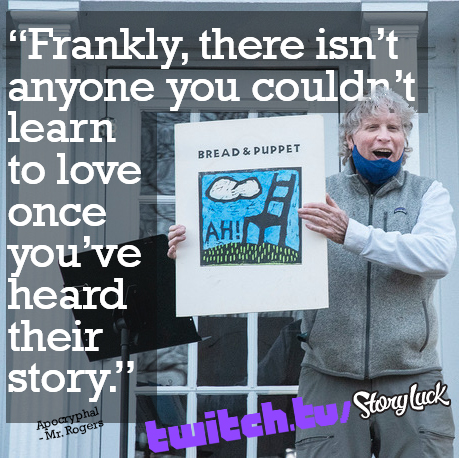These posts are adapted from the 20 minute lessons on story telling presented by Dan at the beginning of our Workshop! Workshop! show.
As you know, here at Story Luck we’re really into the idea of skills being general across the board. Storytelling is a skill and general rules about skills are applicable. So you can learn from athletes, you can learn from anybody who has excelled at a skill, and apply those same techniques to storytelling.
So in pursuit of this, general skill knowledge, Dan was looking into the Great Courses. He picked one up on how we learn from birth to death. And sure enough chapter 11 in this course was on, “How do we learn to tell stories!”
The person who was teaching this class was Monisha Pasupathi. So I’m gonna give you what I have digested from this lecture. Some of the insight goes back to that stuff we discussed from the Elephant in the Brain. (All links are affiliate links.)
Elephant in the Brain talks about how storytelling is integral to building one’s sense of self. But Monisha’s lecture goes deeper. The better you get at storytelling, the better you understand who you are and why you exist.
This formation of self starts at an early age. We establish a sense of self around 18 months. That’s when you recognize yourself in a mirror. It’s when you start being able to distinguish between yourself and others. You start to distinguish objects as ‘mine’ and ‘theirs.’
One of the things to think about is there’s implicit learning and explicit learning. I was familiar with those words but I’d never thought of them in terms of learning techniques! So let me explain, explicit learning is if you go out to learn something specifically e.g. I’m gonna take a math class to learn how to do a certain type of math. I am going to come to this storytelling workshop to learn storytelling. Those are examples of explicit learning. You are actively trying to learn a very specific skill. It’s a purposeful learning.
The flip side is implicit learning. That’s when you’re doing other stuff and you learn new skills without consciously trying to. Let me give you an example because this can be tricky. Social cues are often learned implicitly. You go to a class to learn about math. You interrupt the teacher every time you’re confused. Other students are annoyed and you can tell. So when you come to the next class, you wait till the end of the lecture to ask your questions. You weren’t trying to learn about social cues, you might not even consciously think about waiting till the end of class, you just pick it up.
We tend to learn storytelling implicitly. We don’t set out to tell stories, it’s just intrinsic to how we navigate the world. I got in trouble and I had to figure out how I should get out of trouble. Storytelling is a big part of getting out of trouble as a child. But you aren’t trying to learn storytelling, you’re trying to explain yourself. You pick up the storytelling skill, while you’re searching for how to explain something else.
Another situation in which we learn storytelling, is in the pursuit of things we want. If there is a specific thing I want, I have to convey to my parents that I want it.
I’m not trying to learn how to be a great storyteller, or even just how to tell a story. Instead, I find that creating a story helps me get what I want. We all went through this process.
This is one of the reasons storytelling is different from juggling. It’s different from most other art forms that we have to learn explicitly.
From a very young age we learn how to tell stories as a byproduct of navigating our way through the world; We explain about ourselves, and what we want in the world.
To talk to us more about this topic or see how we walk people through the storytelling process, check out our weekly show, Workshop! Workshop!





